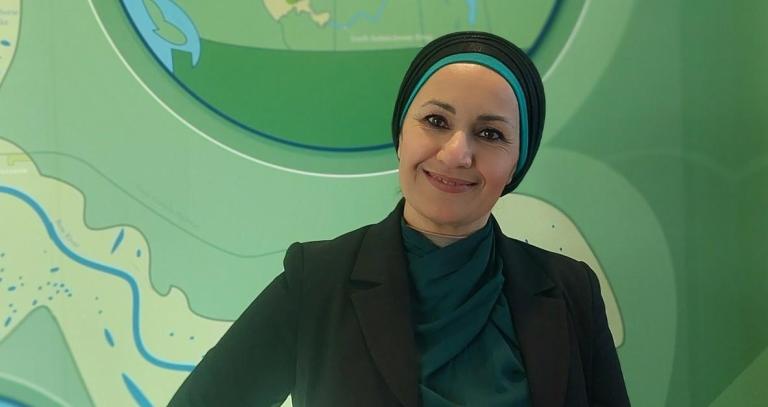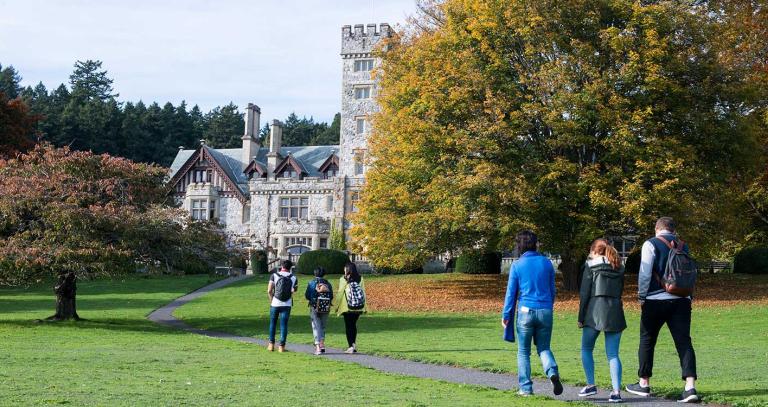Program description
You’re passionate about, and deeply involved in, practical environmental issues. Perhaps your interest ignited through an undergraduate degree in science, or environmental science. Or maybe you’ve already been working in the environmental field for a few years.
Now, you want to take your energy and commitment to the next level, furthering your career in creating a more sustainable world.
The Master of Science in Environment and Management is a transdisciplinary two-year blended program. It combines leading-edge research with on-the-ground practice and theory. You'll be prepared to excel and lead change in your life-long career trajectory, with skills in solving sustainability and environmental challenges in diverse contexts and across sectors.
You’ll examine many topics related to sustainability, from climate pollution and biodiversity loss, to reconciliation and social and community innovations. You’ll learn about strategic decision making, teamwork and the nature of change. And you’ll learn how to address technical and policy questions using systems and sustainability perspectives.
By studying the inter-relationships between human, social and ecological systems, and learning about critical management concepts, you'll be ready to lead sustainability initiatives in multiple sectors, from government to industry and more.
The elective difference
The Master of Science in Environment and Management shares some courses with the related Master of Arts in Environment and Management. The difference is in the elective courses that you'll take.
Master of Science in Environment and Management elective courses include:
- environmental analysis and remedial technologies
- science and impacts of climate change
- toxicology and risk assessment
- ecosystem science and management
- global environmental systems and processes
If you identify a critical skill or knowledge gap in your learning agenda, you have the option of substituting a course elective from another university, upon approval of the program head and director of the school.
Program outcomes
Once you have completed this program, you'll have skills to address global and local environmental and sustainability challenges, and to lead change in multi-sector organizations. You'll be prepared to work in government, public and private sectors.
Program delivery
This program is delivered through a blend of online learning and on-campus residencies.
Online learning
Online courses consist of assigned readings, synchronous or asynchronous lectures, interactive discussions, and individual and team assignments.
You’re expected to meet deadlines and contribute meaningfully to your class. Your contributions are a big part of everyone’s learning.
You will typically take one online course at a time for a period of 10 weeks each. Each online course requires approximately 10-15 hours of work per week.
You'll start your program with a non-credit, but required, course about academic integrity.
Residencies
This blended program has three three-week residencies.
Residencies are intensive and immersive. Many students say this time together is the highlight of their program.
During your residency, you can expect to:
- attend classes full time (e.g., Monday to Friday from 8 a.m. to 5 p.m.)
- complete homework and individual and team assignments outside of class hours
You can also expect to:
- be intensively engaged in deep dialogue and inquiry
- engage in an innovative project, open space technology and fieldwork
- participate in an integrated social and natural science inquiry
- attend planned recreational and evening events
Completion options
You'll complete your degree by writing a thesis or conducting a Major Research Project.
Thesis option
A thesis is a systematic study of a significant problem, issue or phenomenon. It demonstrates your ability to analyze research and data, and apply it to solve a problem, understand an issue, or explore an opportunity. The result is a synthesis of information and/or recommendations for further action.
In the Master of Science in Environment and Management, your thesis will be related to the topics you'll study in the natural or physical sciences. You might test a hypothesis relating to the natural and/or physical world. Or you could conduct a scientifically based case study and analysis. Thinking ahead about what you would like to do for this project is helpful, as it is useful information to include in your application.
Major project option
A Major Research Project is an alternative to the more traditional thesis. It is a good option if you have a very specific challenge to address. To complete it, you may collaborate with an organization, community or association to conduct a participatory research project that leads toward positive ecological, social and/or structural change.
Work while you learn
Online courses, combined with residencies, allow you to learn without having to give up your current employment. While you'll want to check with your employer about your course schedule and any time off you might need, in many cases, employers can support, mentor or sponsor you in your studies.
Courses
Faculty
Transfer agreements
Refine results
Standard admission
- Four-year (or comparable) science-focused undergraduate degree in a related field, with a minimum GPA of 'B' (3.00/4.33), from a recognized post-secondary institution.
- At least two years of relevant work or volunteer experience.
- Applicants who meet the degree requirement, but not the GPA requirement, will normally be required to complete "Academic Writing and Critical Thinking" several weeks prior to starting the program and obtain a minimum final grade of B (73%).
Flexible admission
Applicants who do not meet the Standard Admission requirements will be considered for flexible admission and assessed as follows:
- Normally, six years of relevant work experience, or an equivalent combination of education and experience.
- All flexible admission applicants will normally be required to complete "Academic Writing and Critical Thinking" several weeks prior to starting the program and obtain a minimum final grade of B (73%).
English language proficiency
- If English is not your primary language, please review our English language requirements.
Additional recommendations
- Our program is designed to be of most benefit to environmental practitioners who have an interest in, or a responsibility for, leadership and sustainable decision-making. As such, work and volunteer experience are key requirements of admission to the program.
- Indication of potential thesis topic and thesis sponsor is beneficial to a candidate’s application.
All applications to this program require submission of the following information and supporting documents before your file can be assessed for admission:
Application form
In order to apply online, you will be required to create a log-in account using your email address. You will be required to list all credit courses and/or programs you have completed or are currently enrolled in. An application fee will be required. If your application fees are being paid by a third party, review sponsored student information. Once submitted, you may check the status of your application at any time.
Missed your application deadline? While we can’t make any guarantees, we may be able to accommodate late applications if there's still space and enough time to process. If you're interested in an intake that is now closed to applications, apply for the next available intake and email Admissions with your preferred start date. Make sure you’re prepared to submit your program's required documents right away. We can't make an admissions decision without them.
Official transcripts
Applicants are responsible for arranging for the submission of official transcripts from ALL post-secondary (higher education) institutions currently or previously attended, for all credit courses and/or programs. Transcripts are not required for non-credit programs or courses, though some programs may require proof of professional certifications or designations.
Transcripts are considered official only if submitted directly by the Registrar or other recognized authority of the providing institution in the institution's original, sealed envelope. If the envelope has been opened, the transcripts are no longer official and new (official) transcripts will be required to complete your application.
All international transcripts or credentials are subject to an international transcript and/or credential evaluation.
Personal statement
Your personal statement should be no less than a one-page letter indicating your motivation for seeking entrance to the program. Your statement should comment upon your personal and career goals, the expectations you have for the program in relation to the achievement of your goals, and the strengths you feel you can bring to the program. While it is not necessary, you can also include potential thesis interests and potential thesis sponsor.
Letters of reference
It is ideal if one reference letter is based on your work experience and the other based on either your academic performance or community service that you have undertaken. However, two work-related references are acceptable in certain cases. There is no set standard for letter of reference format. The length and level of detail in each letter may vary.
Content of the reference letters should illustrate and support your suitability for admission to the Master of Arts/Master of Science in Environment and Management program. Content may include how your referee feels you will succeed in the program (and why) and how the program will benefit you. Indication of demonstrated skills, competencies and aptitudes and other relevant information about which the referee can comment is beneficial. The context in which the referee has come to know you should also be mentioned.
Résumé
Your résumé should provide as much information as possible, with special attention given to the past ten years of your career. As a guideline, items in your resume should include:
- Post-secondary education: List all post-secondary education, degrees, diplomas, and certificates you have achieved.
- Training and professional development: List career-related training and professional development programs. Include the source of training, and the duration and year completed. List other training and personal development programs not already identified.
- Work experience: Please include name of organization, position, length of service and brief description of duties.
- Voluntary/unpaid work experience: List and describe any voluntary/unpaid post-secondary employment and/or community service experience. Please include the name of the organization, length of service, and a brief description of duties. List positions you have held in this service.
- Information technology training and experience: Briefly describe your level of training and experience in the use of information technology including computers, software and telecommunications networks as tools for business, education, teaching and personal use.
- Professional memberships/affiliations: List memberships and positions you hold/have held in professional associations, service clubs, community/volunteer sector.
- Other relevant information: Provide any other information which you believe is relevant to your application and will be of assistance to the review committee.
If applicable:
- Applicants declaring permanent resident or Convention Refugee status in Canada, must submit a copy of their Permanent Resident Card (PR card) along with their application.
- Transcript evaluation fee or credential evaluation report, if submitting international transcripts.
- An official English language proficiency score report or other evidence of proficiency if English is not your primary language.
- Other information or documents as may be requested to determine your eligibility.
For information on how and where to send your supporting documents, please refer to the document submission guidelines.



